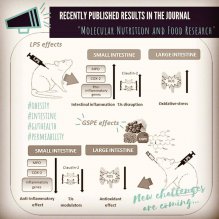Recently puplished article regarding GSPE effects on the inflammed gut
Protective Effect of Proanthocyanidins in a Rat Model of Mild Intestinal Inflammation and Impaired Intestinal Permeability Induced by LPS
Abstract
Scope
Intestinal dysfunction consists of a defective barrier function, which allows the influx of luminal endotoxins, thus causing intestinal inflammation. Proanthocyanidins are natural bioactive compounds that could modulate intestinal dysfunction. This study analyzes the protective effects of proanthocyanidins in a rat model of intestinal dysfunction.
Methods and results
To investigate the preventive effects of both high dietary (75 mg kg-1 body weight) and pharmacological (375 mg kg-1 body weight) oral doses of proanthocyanidins (GSPE), rat intestinal dysfunction is induced with LPS (i.p.). In vivo intestinal permeability (ovalbumin [OVA] assay) and systemic inflammation and endotoxemia (TNF?α and LPS plasma levels) are assessed. Intestinal inflammation and oxidative stress are determined using myeloperoxidase (MPO), cyclooxygenase?2 (COX?2) activities, and reactive oxygen species (ROS) levels, respectively. Ileal gene expression of permeability/inflammatory genes is analyzed.
LPS administration induces intestinal permeability, inflammation, and oxidative stress. GSPE normalizes in vivo OVA levels. In the small intestine, the GSPE treatment decreases MPO and COX?2 activities; modulates the ileum inflammatory and permeability proteins gene expression; and in the large intestine, prevents increase of ROS levels.
Conclusions
Proanthocyanidins, at nutritional and pharmacological doses, prevents endotoxin?induced?intestinal inflammation, permeability, and oxidative stress in rats differentially in each intestinal section. Proanthocyanidins are nutritional?therapeutic novel candidates for preventing intestinal dysfunction.

